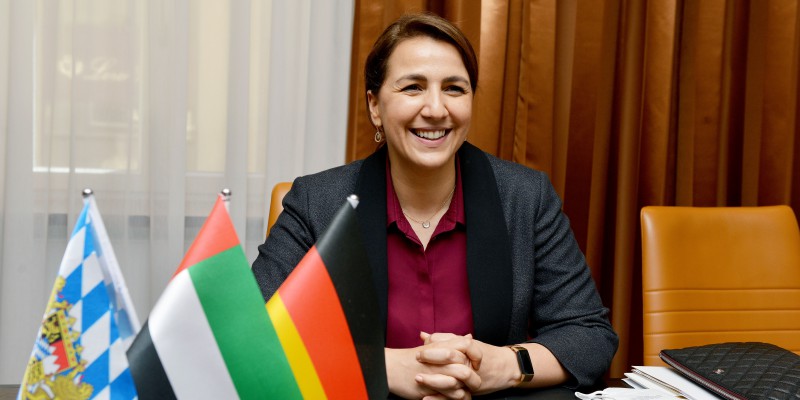
Süddeutsche Zeitung
16 July, 2021
Author: Paul-Anton Krüger, Munich
Mariam
al-Mheiri once studied mechanical engineering in Aachen. Now, as Minister of
State, she is responsible for food and water security - and is expected to
polish up relations with Germany.
She always
wanted to do something that no Emirati woman before her had managed to do.
"It was always in my head as a teenager, whether it was horseback riding,
scuba diving or tennis," Mariam al-Mheiri says. "I wanted to be a
tennis pro." At the very least, an interest in the underwater world should
still play a role in the career of the UAE's Minister of State for Water and
Food Security - a position she is not only the first woman to hold, but one
that was created for her and is arguably unique in the world.
Instead of
the world's center courts, her path led her to the German provinces, to Aachen.
"When we were 16 or 17 and thinking about where we could study, I first
had the U.S. or the U.K. in mind," al-Mheiri recalls. But then, for his
graduation, her family visited an uncle who, like her German-born mother's
other brother, had studied at the Rheinisch-Westfälische Technische Hochschule
(RWTH). "They always spoke highly of the university, of university life;
and I was also impressed by Aachen," says al-Mheiri.
She called
RWTH and asked whether "a girl from the Emirates" had ever studied
there. The answer: no. So al-Mheiri enrolled in mechanical engineering. "There
weren't that many women there overall," she recalls. At the time, she had
to complete her studies in German. She hadn't learned that at school, only as a
child from her mother. But that didn't stop her; it predestined her for another
office which she now holds: Special Envoy for the Relations with the Federal
Republic of Germany.
She has
taken over the job from Sultan al-Jaber, who is considered the right-hand man
of Crown Prince Mohammed bin Zayed al-Nahyan, the regent of the Emirates. He
attaches great importance to the strategic partnership with Berlin, which can
be read as proof of his confidence in al-Mheiri.
Criticism
of human rights violations scratches image
"I
want to be a contact person," she told the Süddeutsche Zeitung during a
visit in July, and "make sure that people understand who we are and that
we open our arms to the international community." Tolerance and peaceful
coexistence are among the government's maxims. People from 200 nations live in
Dubai; there are churches, Buddhist temples, synagogues. The Emirates have
normalized their relations with Israel - al-Mheiri recently visited the
country.
However,
there is also criticism of human rights violations and of the country's at
times brash regional policy, which also caused irritation in Berlin. Polishing
her country's image in Germany is one of al-Mheiri's tasks. She certainly does
not lack enthusiasm. She sees potential above all in economic cooperation and
in the exchange of technology. Here, too, her studies in Aachen are reflected
in her political activities.
"I
actually wanted to do aerospace engineering," says al-Mheiri, who also
began private pilot training during her time in Germany. After one semester,
however, she switched to construction and development. Today, she promotes
innovative start-ups in agriculture that use new methods to enable sustainable
food cultivation in the harsh conditions of the Emirates' deserts.
Originally,
she had not thought of working for the government. She found her first job in Germany
in a start-up that produced ball bearings for racing cars. Her father only
said, "As long as you don't work as a car mechanic," she says with a
laugh. But ultimately, his connections contributed to his daughter not pursuing
her plan of seeking a job with the Emirates airline, but instead joining the
civil service.
She met the
former Minister of Environment and Water, an acquaintance of her father, at an
event. From a small talk about hobbies and family, a professional perspective
unfolded. Diving and an interest in fish met the need for engineers who would
help develop modern aquaculture. Instead of aircraft engineering, al-Mheiri's
life soon revolved around biofilters and mechanical filters, the reuse of
water. Again, she was the first woman, her rise rapid thereafter.
"When
I do something, I do it with passion," she says. The political leadership
takes up initiatives; they just want to be convinced that a project will move
the country forward, and that it fits into the vision for the Emirates' development.
Food Tech Valley, modeled on Silicon Valley, is her flagship project, which has
succeeded in winning over the highest authorities to her proposals.
So-called
ag-tech start-ups, which use technical innovations for a modern agricultural
economy, are to settle there. "If you grow tomatoes outside, you need 250
liters of water for one kilogram," she calculates; inside, it's only 25
liters. "But of that, 20 liters is just for cooling the plant's environment
through evaporation - and for cooling, we can use treated wastewater."
The
Emirates can already supply themselves with cucumbers and dates. Al-Mheiri is
now courting German founders. Start-up financing from the Emirates is intended
to lure them to Dubai. And from there, they should not primarily export fruit
and vegetables to the region, but technology and knowhow.
Her goal is
ambitious: by 2051, she wants to achieve first place in the Global Food
Security Index, which uses 59 factors to assess supply security. Only those who
set high goals can also achieve something - that is the philosophy of the
Emirates. That's what Mariam al-Mheiri stands for.